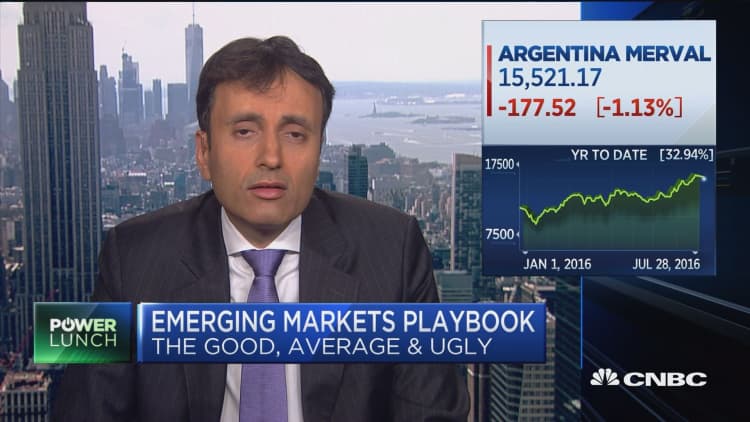
Hedge funds needed a profitable trade, and they just may have found it.
Managers in the nearly $3 trillion industry love emerging markets, a group that had been lagging well behind other areas but recently has shown strong returns.
The sector pulled in $1.2 billion in net long positions over the past month, according to Bank of America Merrill Lynch. That put total net longs to $15 billion for asset managers, the most bullish position going back to at least October 2009, which is as far back as BofAML records go.
That rush of institutional cash comes at a time when emerging markets are on the comeback trail. Slumping commodity prices and fears of a slowdown in China had been hampering EM investment, but that has changed.
Investors are looking for spots across the globe to put money. More than $67 billion has made its way into 30 emerging market nations, notable among them Pakistan, according to figures from the Institute of International Finance reported Monday in the Wall Street Journal.
After a brutal start to the year, indexes measuring emerging market stocks have posted solid gains in recent months. The MSCI Emerging Markets index is up about 27 percent since bottoming in the latter part of January.
The benchmark, however, is still hovering around bear market territory — down just shy of 20 percent — since the September 2014 peak. That could mean room to run should the sector put its troubles in the rear-view mirror.
"The rally in emerging market equities has been given another leg up as it has become less likely that the Fed will hike interest rates any time soon, and China's economy has shown signs of improvement," David Rees, senior markets economist at Capital Economics, said in a note to clients. "While these props may begin to crumble before long, we see other reasons to think that EM equities will register further gains through to 2018."
While Capital Economics is among a crowded field of forecasting firms that thought the Fed would have hiked again by now, the U.S. central bank has been on hold since enacting its first rate increase in eight years in December 2015. The fed funds futures market now projects the central bank to hold off until well into 2017 before moving again. Fear of monetary tightening was one of the major concerns for EM investors.
Rees believes the Fed may hike before the end of the year, and he anticipates that China fears will persist.
"Nonetheless, we suspect that EM equities will continue to climb," he wrote. "Even if the Fed starts to hike rates again before year-end, we think that global monetary conditions will remain loose as central banks in Japan, the euro-zone and UK loosen policy again sooner rather than later."
He also believes commodity prices will edge higher. All told, Rees said he sees emerging market stocks rising 20 percent by the end of 2018.
That would come as welcome news for a hedge fund industry that has struggled to deliver returns in recent years. As a group, hedge funds rose 1.29 percent in July, with returns year-to-date of 2.29 percent, according to BofAML estimates. The index is up just over 6 percent for the year.


